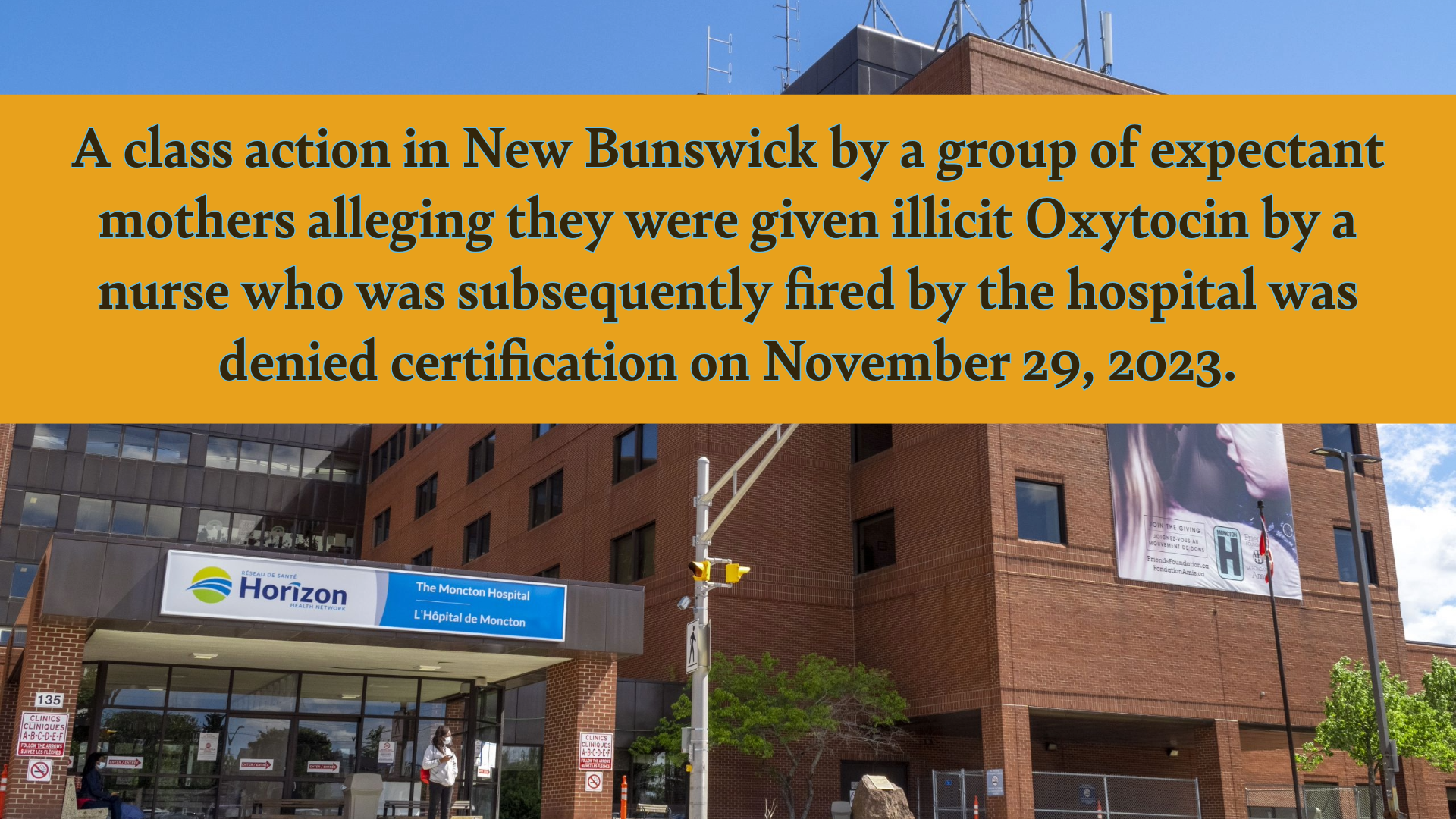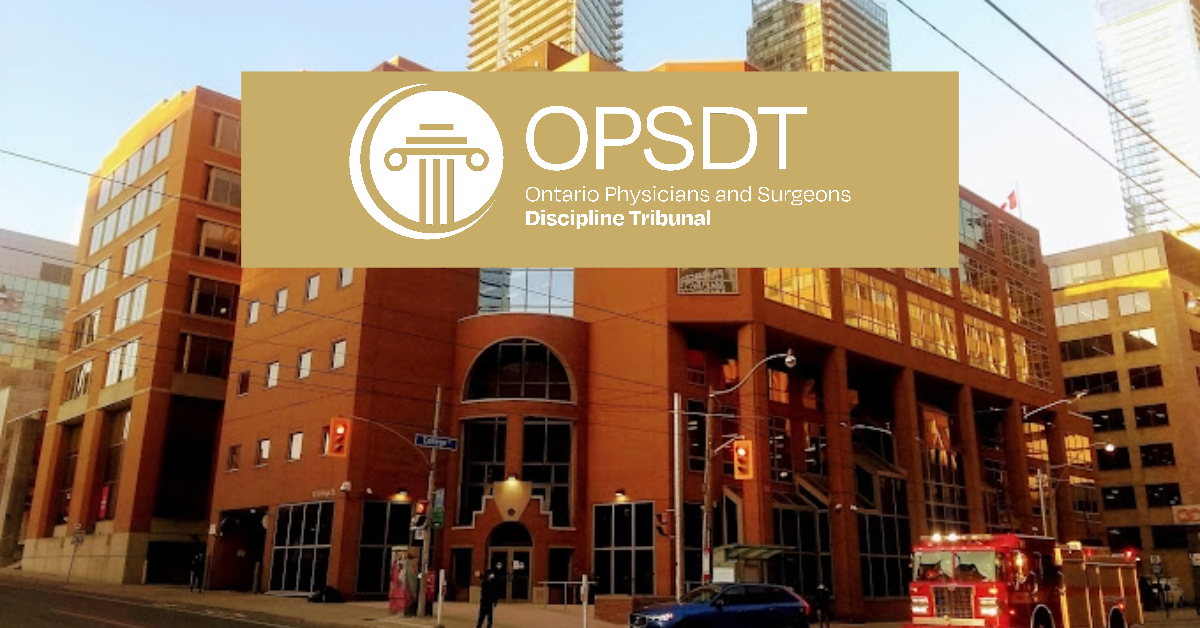
Nurse Alters Morphine Record, Patient Dies: CNO Orders Permanent Resignation
A Profound Breach of Trust in End-of-Life Care In CNO v. Lindsey Coyle, the Discipline Committee of the College of Nurses of Ontario addressed one

On November 29, 2023, the Court of King’s Bench of New Brunswick dismissed a certification motion for a class action against the Moncton hospital and registered nurse, Nicole Ruest relating to alleged unauthorized administration of oxytocin causing emergency C-sections and emergency deliveries.
Oxytocin is a synthetic hormone used as a medication to assist labouring mothers establish regular contractions. The use of oxytocin must be carefully controlled and monitored as each mother and baby may react differently. The dosage of oxytocin is generally started at a low level so that the attending medical staff can carefully monitor the reaction to the medicine of both mother and baby. Oxytocin can only be given to a patient on the order of a physician.
FACTS
On March 27, 2019, the proposed representative Plaintiff, Jayde Scott, was admitted to the labour and delivery unit of the Moncton hospital in preparation for the delivery of twins. The Plaintiff was cared for by an obstetrician who had planned to induce the Plaintiff’s labour on March 27, 2019.
The Plaintiff was attended on following her arrival at the hospital by the Defendant registered nurse Nicole Ruest. She was given an IV shortly after her arrival at the hospital. Soon thereafter the expectant mother began to experience strong and prolonged contractions which caused the babies to go into fetal distress. Ms. Scott underwent an emergency Cesarean section to deliver the babies given the concerns for their well-being.
As a result of concerns for the quick onset of contractions experienced by the Plaintiff, the IV bag that was administered to her was tested and was found to contain illicit oxytocin that had not been prescribed to the patient by her doctor. Reportedly, nurse Ruest was dismissed from the Hospital that same day.
The Court also received evidence from eight other obstetrical patients who all alleged similar experiences surrounding the birth of their children. These mothers indicated that they were informed by their obstetricians that the emergency C-sections or emergency deliveries they experienced were likely caused by an overdose of oxytocin.
DECISION
While the motions judge accepted that the Plaintiff had met the burden of proving that a viable cause of action has been pled and there was an appropriate representative plaintiff, the Court was unable to conclude that there was an identifiable class from which common issues arose that would best be resolved through the mechanism of a class proceeding.
The motions judge was equally unable to conceive of an appropriate litigation plan that would allow a class proceeding to be truly the most efficient way to manage these potential claims of medical malpractice and negligence.
In the Court’s view, it would appear unavoidable that the determination of the likelihood that each potential class member received an illicit dosage of oxytocin, and that this caused the emergency delivery, would require individual trials with expert evidence unique to each claimant. Membership in the proposed class could not be determined without the benefit of a trial where a finding of fact of an inappropriate administration of oxytocin could be made.
Certification of this action as proposed would simply result in a series of individual actions caught under the umbrella of a class action.
For these reasons, the motion for certification of this medical malpractice class proceeding was denied.
EXERT LIABILITY WITNESSES
Plaintiffs’ Expert
Dr. John Barrett, a maternal-fetal medicine specialist, filed an affidavit in support of the motion for certification. It was Dr. Barrett’s opinion from the hospital data that “…there does indeed it appears to be a spike in the rate of caesarean sections at the Moncton Hospital in 2017. Whether or not this is related to inappropriate oxytocin use at the institution at that time will require a more in-depth look at the causes of the caesarean section and also further data points which are not yet available from this database.”
Defence Experts
Dr. Nicholas Braithwaite, an obstetrician and gynecologist, filed an affidavit in support of the Defendant hospital. In his affidavit, he noted that “… determining whether or not the cause of an emergency Caesarean section was the result of illicit oxytocin administration, or even if a patient received illicit oxytocin, would be impossible if one were to base the decision solely on either the documentation of an emergency Caesarean section having had been performed, or the presence or absence of any specific face sheet or coding documentation.”
Dr. Gareth R. Seaward, a maternal-fetal medicine specialist, filed an affidavit in support of the Defendant registered nurse. It was Dr. Seaward’s opinion that “… the mere fact that oxytocin was used does not necessarily indicate that a subsequent emergency Caesarian section or forceps delivery was a direct consequence of administration of oxytocin, legally or otherwise.”
Decision Date: November 29, 2023
Jurisdiction: Court of King’s Bench of New Brunswick
Media: Judge denies motion to certify class action against fired Moncton nurse

A Profound Breach of Trust in End-of-Life Care In CNO v. Lindsey Coyle, the Discipline Committee of the College of Nurses of Ontario addressed one

What College of Physicians and Surgeons of Ontario v. Thirlwell, 2026 ONPSDT 5 Means for Patients and Public Trust In College of Physicians and Surgeons